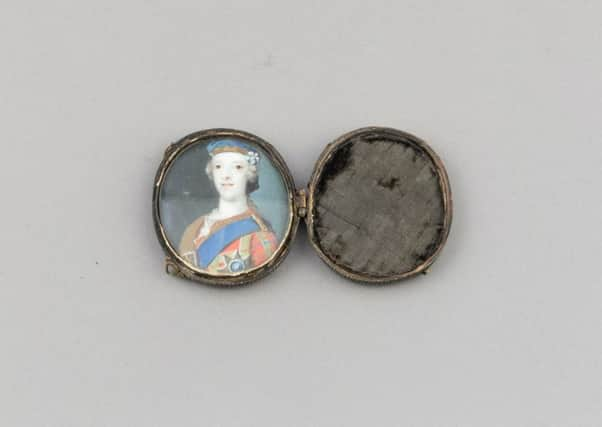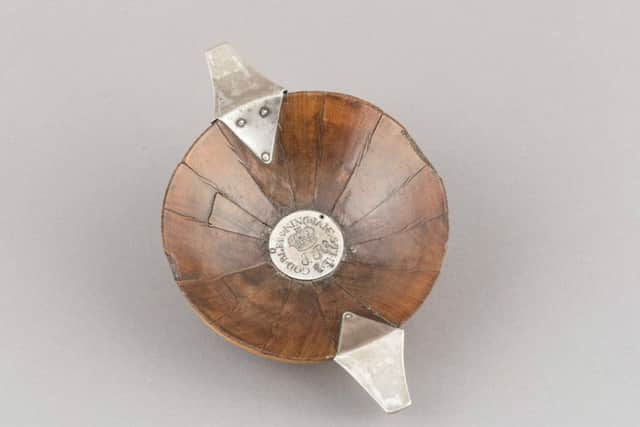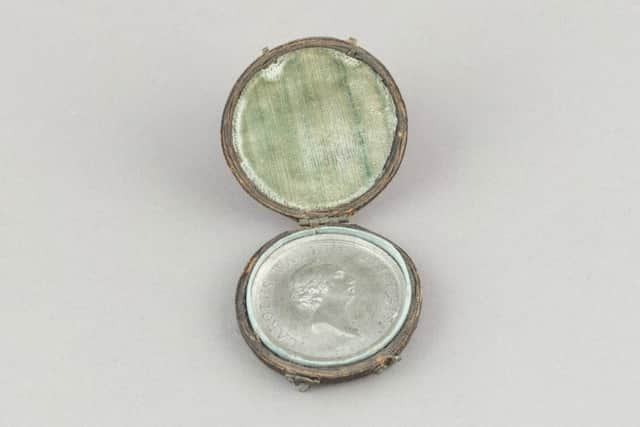Bonnie Prince Charlie's gifts to a 14-year-old soldier


William Home, from Duns in Berwickshire, received a quaich, a medallion and a miniature of the Prince in recognition of his service during the 1745 rebellion, after which he was captured and sentenced to the death penalty.
Born in 1731, Home joined the Jacobite army initially as a coronet and then as Ensign in Lord Balmerino’s Life Guards.


Advertisement
Hide AdAdvertisement
Hide AdFighting at Prestonpans, Falkirk and Culloden, Ensign Home carried the regimental standard onto the battlefield and occasionally acted as an aide-de-camp to Charles Edward Stuart.
The soldier survived the rising and, following Culloden, made his way to Ruthven Barracks by Kingussie to hear Lord George Murray, the Jacobite general, tell his soldiers to “shift for ourselves as there were no more occasion for our services”.
Catriona McIntosh, head education guide at Culloden Battlefield and Visitor Centre, said: “Home was then captured and held initially at Stirling Castle then transported to Carlisle.


“He was sentenced to the death penalty, and considerable efforts were taken to secure him a reprieve.”
Advertisement
Hide AdAdvertisement
Hide AdHome directly petitioned George II for his release, describing himself as a “your unhappy petitioner” who was “first seduced to depart from his allegiance” when just 14.
The young soldier described himself as “fitter to be employed at school, than waging a rebellion…”
Further petitions were made by his family, who enlisted the help of the 8th Earl of Home, who fought for the British at the Battle of Prestonpans.


In November 1746, Home was secured a reprieve from the death sentence on condition of transportation for indentured service,
However, he was ultimately exiled to live on the continent.
Advertisement
Hide AdAdvertisement
Hide AdHome served as a Colonel in the Prussian army of Fredrick the Great and in 1774 he returned to Scotland where he lived for the rest of his life.
He died in 1794, aged 63.


His three gifts from Bonnie Prince Charlie were donated to the Culloden Battlefield and Visitor Centre by the Logan-Home family with other items in the collection including a cavalry carbine used during the rising.
Ms McIntosh said William Home was not the only boy of his age to fight on either side of the rebellion.
She added: “What is really important to remember is that in the 1740s you could be deemed an adult in their mid-teens and individuals who we would now recognise as children and young people, were not protected from joining or being signed up to military forces.
Advertisement
Hide AdAdvertisement
Hide Ad“Both armies at Culloden had boys aged 13 and upwards enlisted. From Drummer Boys, Ensigns, Standard Bearers and Baggagemen they would have carried out many tasks as well as soldiering.”
The youngest fighter taken into custody during the 1745 rising was seven-year-old William Cosby, the son of an Irish weaver.
Both had served in the Manchester Regiment, which held Carlisle after its capture in November 1745, and both were taken prisoner after it was seized by Cumberland’s men once Bonnie Prince Charlie retreated north.
William’s father was sentenced to death but won a reprieve on the day of execution, according to John Prebble’s Culloden.
Advertisement
Hide AdAdvertisement
Hide AdWith no record of what happened the boy, it has been suggested he died in Carlisle Prison.
Records shows there were several fathers and sons who signed up together, Ms McIntosh said.
Hugh Roy, age 14 from Aberdeenshire joined the Duke of Perth’s with his father, John Roy.
Both were taken prisoner at Carlisle but the father died in prison before trial and Hugh was pardoned on enlisting in the Government army.
Advertisement
Hide AdAdvertisement
Hide AdCaptain William Gordon, 15, the grandson of Gordon of Glenbucket, fought at Culloden and escaped to Sweden with his father and grandfather.
Ms McIntosh added: “During times of conflict families and children are always caught up- and the ’45 was no different.”
